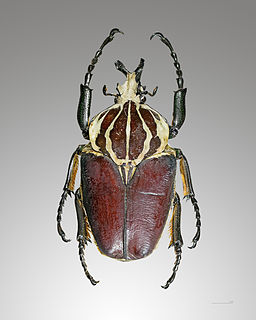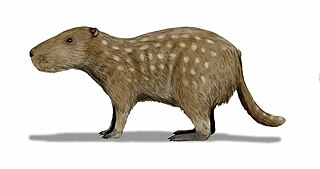 W
WThe term Australian megafauna refers to a number of large animal species in Australia, often defined as species with body mass estimates of greater than 45 kg (100 lb) or equal to or greater than 130% of the body mass of their closest living relatives, that lived during the Pleistocene Epoch. Most of these species became extinct during the latter half of the Pleistocene, and the roles of human and climatic factors in their extinction are contested.
 W
WThis is a list of the species of canidae ordered by maximum reported mass in the wild. It does not contain canid hybrid or any domesticated animals. Only wild species of canids are included of which all are described as species by most authentic data.
 W
WInsects, which are a type of arthropod, are easily the most numerous group of multicellular organisms on the planet, with over a million species identified so far. The title of heaviest insect in the world has many rivals, the most frequently crowned of which is the larval stage of the goliath beetle, Goliathus goliatus, the top size of which is at least 115 g (4.1 oz) and 11.5 cm (4.5 in). The largest confirmed weight of an adult insect is 71 g (2.5 oz) for a giant weta, Deinacrida heteracantha, although it is likely one of the elephant beetles, Megasoma elephas and Megasoma actaeon, or goliath beetles, both of which can commonly exceed 50 g (1.8 oz) and 10 cm (3.9 in), can reach a higher weight.
 W
WThis list contains terrestrial members of the order Carnivora with an average reported mass of 160 kilograms (350 lb) or more.
 W
WThe list of largest reptiles includes living crocodilians that reach a length of 6 m (20 ft) and more, such as Orinoco crocodile, American crocodile, Nile crocodile, saltwater crocodile, gharial and false gharial. The largest known crocodilian specimen measured 6.78 m (22.2 ft) and was shot in South America by Aimé Bonpland. Unconfirmed reports of larger crocodilians exist, but examinations of incomplete remains indicate a length of less than 7 m (23 ft) and 2,000 kg (4,400 lb).
 W
WThis is a list of largest rodents.
 W
WThe largest living snakes in the world, measured either by length or by weight, are various members of the Boidae and Pythonidae families. They include anacondas, pythons and boa constrictors, which are all non-venomous constrictors. The longest venomous snake, with a length up to 18.5–18.8 ft (5.6–5.7 m), is the king cobra, and the heaviest venomous snake is likely to be the Gaboon viper or possibly the Eastern diamondback rattlesnake – all three of which reach maximum weights in the range of 6–20 kilograms (13–44 lb).